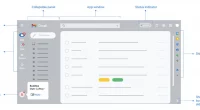Already under pressure from investors, its users and regulators alike, Facebook parent Meta’s earnings did not bring much joy to that grim picture. The company reported revenues of $28.82 billion in the quarter on earnings of $2.46 per share. Both missed analysts’ estimates of $28.94 billion and $2.61 per share respectively. In fact, this translated to 1% drop in revenue, the very first quarterly year-on-year decline since it went public.
Another fall in Meta’s performance in Q2 2022 was recorded in its net income in the quarter, which fell by 36% year-over-year to reach $6.68 billion. Its income from operations also fell by 32% to reach $8.35 billion, while its operating margin fell to 29%.
A chunk of this loss came in from the Reality labs division. In its earnings report for the quarter ended June 30, 2022, Meta posed a loss of $2.81 billion in the Reality Labs division, while pocketing $452 million in sales. It is yet to clock a profit in its Reality Labs division (which comprises of its AR and VR operations, the cornerstones of the metaverse) this year.
This is, however, lesser than the loss of $2.96 billion it incurred in the first quarter and lesser than the $3.67 billion that analysts had expected. It also missed expectations on earnings and revenue for the quarter while recording more losses across other segments, including yet another decline in year-over-year sales (for the second consecutive time).
The company’s shares fell by nearly 4% to reach $163.25 in after-hours trading on Wednesday, though it later rose to currently reach $169.58.
Users finally going up
After a scare in the fourth quarter of 2021, where its flagship social media platform Facebook reported its first-ever decline in daily active users, Meta rallied in the second quarter to record an increase in its user base. In Q2 2022, it noted that Facebook’s daily active users (DAUs) and monthly active users (MAUs) rose by 3% and 1% respectively. They, at the end of the quarter, stand at 1.97 billion and 2.93 billion respectively.
Meta’s Family of Apps, which includes Instagram and WhatsApp, clocked increases in both DAUs and MAUs in the quarter, and brought in $28.37 billion in revenue (a year-over-year decrease). Its Reels has reached $1 billion in annualized revenue as well.
Meta also clocked increases in ad impressions and average price per ad (both increased by 15% and 14% year-over-year respectively). Its average revenue per user fell just shy of analyst expectations to reach $9.82. Its headcount clocked a year-over-year rise of 32% to reach 83,553 as well.
This is unlikely to grow much this year, especially since the company earlier said that it, like many other companies this year, intended to slow the pace of recruitments. In fact, Meta CEO Mark Zuckerberg said that Meta intends to reduce its headcount over the next year.
Despite this, the future does not look so good for Meta, as it issued a rather weak forecast for the future. The company said that its Reality Labs division, which has already gobbled up millions, is likely to generate even lesser revenue in the third quarter. It also expects around $26-28.5 billion in revenue, failing to reach the estimated $30.5 billion.
It defended its weak Q3 forecast with “continuation of the weak advertising demand environment we experienced throughout the second quarter, which we believe is being driven by broader macroeconomic uncertainty.” Other forecasts include incurring $85-88 billion in total expenses and $30-34 billion in capital expenditures over the year.
“We seem to have entered an economic downturn that will have a broad impact on the digital advertising business,” Zuckerberg said during the company’s earnings call. “Given the more recent revenue trajectory that we’re seeing, we’re slowing the pace of [our] investments and pushing some expenses that would have come in the next year or two off to a somewhat longer timeline.”





